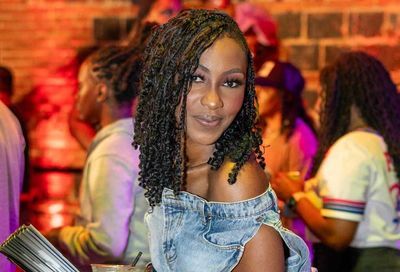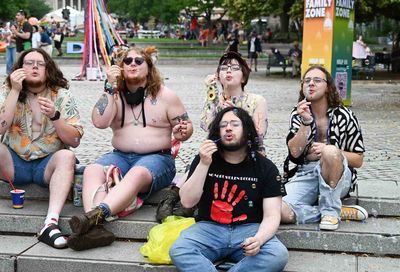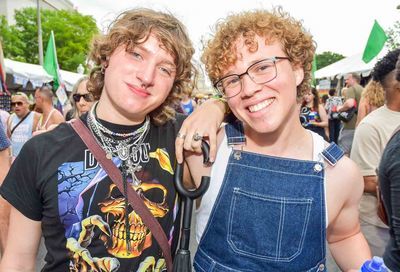The Wainwright Stuff
A Conversation with the Gay/Lesbian American Music Award-Nominated Singer-Songwriter, Rufus Wainwright
METRO WEEKLY: You come from a family of well-known folk musicians, a homestead where music was an everyday occurrence. What influence did your parents — Kate McGarrigle, of the McGarrigle Sisters, and Loudon Wainwright III — have on your career?
RUFUS WAINWRIGHT: While both my parents were musicians, they didn’t sing together — both had separate careers. Soemtimes I felt like I could never accomplish what they did, musically. They were so well-known. So I had to really prove myself. There was to easy way to do it. Both my parents tended to be critical, which was good — they knew how hard it was, in general, to survive in this business. You had to be good. I probably would have been a musician anyway, even if I wasn’t very good.
MW: Did they encourage you when you started off down this career path?
RUFUS: Encouraged. Especially my mother because she realized quite early on that I had some kind of ability.
MW: One of the things that surprised me when I was doing research on you was your passion for opera.
RUFUS: I don’t know how that happened. I was 14 when I first heard my first opera stuff — it wasn’t really an opera, it was Verdi’s “Requiem” — and it immediately fascinated me. The sound and the breadth of the music. I couldn’t listen to anything else for a long time. I wanted to become a classical composer as opposed to becoming a folk musician — it really wasn’t the hip thing to do, that’s for sure.
MW: I find I am a melody-driven person –by that I mean I pay more attention to the melody than the lyrics. I know people who do just the opposite. What about you? Is a good melody more important than a good lyric? Or is it the other way around for you?
RUFUS: A melody comes naturally to me. I think melodies come from another sort of planet. When you write a melody, it’s not necessarily you writing it — it’s like you’re channeling some type of music that already exists. That’s what I believe. Any great composer is just taking from God — or something. But the words, for me, personally — are the most difficult, challenging part. In a great song, the lyrics can’t show off too much but have to stick in your head. Whereas I think the melody usually wins and is more natural. The words are the architecture, the framework.
MW: Your lyrics, at least on this album, seem to be very personal.
RUFUS: I just try and make it as honest and real as possible. I dig deep for that stuff. This album, especially, encapsulates my youth, when I was 17, 18, 19, 20. That was when all of this stuff was happening. So it’s a very delicate album in that way. I don’t think I’ll necessarily ever be able to capture that again, which is fine. I’m 25 and have another life I lead now. But I think music written from that period in one’s life is usually very personal and almost sophomoric at times. But it’s still charming, you know?
MW: I don’t think there’s anything sophomoric about these lyrics from the song “Foolish Love”: “I don’t want to hold you and feel so helpless. I don’t want to smell you and lose my senses, and smile in slow motion with eyes in love.” That’s incredibly poetic.
RUFUS: I don’t know if I feel that way anymore about people. I don’t want to smell anyone anymore. [Laughs.] But I’m still looking for the same feelings and the same sort of love, you know? A powerful love. I’ve gone through a lot in the last few years with this record. And I feel like I’m getting a little crazier. And a little bit more jaded. I think my next record will show more of my nastier side.
MW: What was your coming out like?
RUFUS: Pretty traumatic. I was 14 at the time, and it was right smack in the middle of the early AIDS thing. I thought I was going to die for about five years, because I’d had sex when I was very young. And in those days I thought you got AIDS if you kissed somebody. So I was constantly surrounded by fear of dying…
My mother wasn’t happy when she found out. She’d found a magazine or something and so I told her. She basically told me, “Don’t tell me something I don’t want to hear.” And I went, “Okay.” And then I basically told her I was straight. She just wanted to live in denial for a while which I think a lot of parents want to do. I came out again much later, when I was 18. I made the announcement and then it was more accepted.
At that point, I really wanted to go out and do everything. Have the perfect boyfriend, the perfect sex life, and the perfect apartment. I was actually quite disappointed by what the gay life had to offer me — at least in Montreal.
MW: What disappointed you?
RUFUS: I was disappointed by a lot of the music, frankly, and the culture. Sure, I wanted to get laid, I wanted to have sex, I wanted to fall in love. But that’s not all I wanted. I was going out to all the clubs. They played the same music and the people dressed the same. I had 30 one-night stands. I wasn’t really getting anywhere. So I went and hung around a lot of straight bars because at least there we could talk about other things besides sex. I fell for a lot of straight boys.
Advertisement
|
MW: Ah, the straight boy thing.
RUFUS: Well, I was into straight bars, you know? Not a lot of straight boys, but a couple. And they certainly fell for me in many ways.
MW: You mention the perfect boyfriend. What would be the perfect boyfriend for you?
RUFUS: [Laughs.] He’s got to be about nine feet tall. And part of royal family! And made of steel…. No, I fall pretty quickly — and if I see someone who might fit the bill, I’ll go for them immediately. I’m not shy about that stuff. I don’t really have a perfect type — I’m open to surprises. But my standards are pretty high. So it often doesn’t work. I think maybe I’m looking for myself.
MW: One would argue many of us are. What kinds of character attributes would make the perfect boyfriend?
RUFUS: [Laughs.] I feel like I’m on the dating game. I don’t know, someone who is funny. Somebody who can make me relax in all of this craziness that I’m going through right now. What I never thought would happen is that I could go out with anyone [who comes to my shows]. There’s a lot of power involved in performing, and my audience is very gay — there is a might good selection of guys there. But I find it hard to approach them, because I’m shy. I need someone to come out and just say, “Come with me, I’ll take care of you.” I basically need to be swept off my feet by someone who has something higher than I do. Some day my prince will come.
MW: What was it like knowing your dad had a hit song called “Dead Skunk in the Middle of the Road” playing on radios everywhere in the seventies? I mean, you couldn’t escape that song.
RUFUS: I was too young at that point to remember that. I was also living in Canada, and “Dead Skunk” was certainly not as big in Canada as it was in the United States. So I managed to escape that. But it was his only hit, and it became a big deal. There were two sides to it. I would go see shows of his and he’d play it, and it was exciting. As I got older, I realized that that [song] was it for him in a certain way, and it was quite depressing. He always struggled with that. I don’t think he struggles with it as much now, but there was a real period there, after a lull in his career, that he had to struggle with the fact that that was his only hit. It was hard to watch him go through that. Because that [song] isn’t what he’s about. He writes great songs about all sorts of issues. Dead rodents are really just a drop in the bucket.
MW: What does applause mean to you?
RUFUS: It’s pretty comforting. It’s exciting. I tend to enjoy the attention. The applause is great after a song, but you can really tell also while you are singing a song that it’s having an effect. And it’s almost like what happened is that everyone suddenly disappears for a second, that they know that they are disappearing. And it’s like I’m alone in my own room, playing. You forget where you are and you take a little trip or something. That, to me, is the most exciting part of performing, when you lose all sense of time and space. It’s almost like 2001 or something.
MW: It sounds magical. It seems intimacy with your audience is important to your style. What happens when you get to the point that you start playing the larger venues?
RUFUS: I’ll have an orchestra. That’s where I want to go with all of this — an orchestra tour. “Rufus Wainwright and the Metropolitan Opera” kind of thing. The good old Judy Garland thing.
MW: You know what’s interesting about you? You happen to be one of the few entertainers who have been out from the start. There’s none of this coming out in mid-career. By entering into the industry as a gay man and just saying “This is part of who I am, take it or leave it” is to make a pretty powerful statement.
RUFUS: There might have been a time when it was fun to be mysterious, fun to be androgynous or closeted. But these days, people really like to be told the truth. You know? People really appreciate that. They’ve had enough of being lied to. My experience with the gay thing is that, I just say it and the audience is like, “Oh, wow. We don’t have to wonder. We don’t’ have to question. We can just like sit back and enjoy the music.”
MW: Speaking of music, whose do you prefer? You mom’s or your dad’s?
RUFUS: [Laughs.] I don’t know. They are totally different. It’s like the sun or the moon. Which one do you prefer?
Support Metro Weekly’s Journalism
These are challenging times for news organizations. And yet it’s crucial we stay active and provide vital resources and information to both our local readers and the world. So won’t you please take a moment and consider supporting Metro Weekly with a membership? For as little as $5 a month, you can help ensure Metro Weekly magazine and MetroWeekly.com remain free, viable resources as we provide the best, most diverse, culturally-resonant LGBTQ coverage in both the D.C. region and around the world. Memberships come with exclusive perks and discounts, your own personal digital delivery of each week’s magazine (and an archive), access to our Member's Lounge when it launches this fall, and exclusive members-only items like Metro Weekly Membership Mugs and Tote Bags! Check out all our membership levels here and please join us today!




























